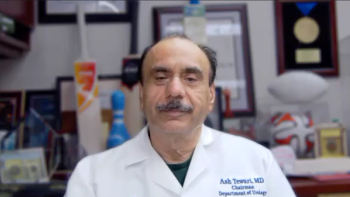
Metastatic Urothelial Carcinoma: Overview of Treatment Options
Expert oncologists provide a comprehensive overview of treatment options available to patients with metastatic urothelial carcinoma.
Episodes in this series

Transcript:
Petros Grivas, MD, PhD: Tian, we’re discussing the metastatic disease setting. So much is changing. Can you give us an overview of the guideline-based treatment of metastatic or advanced disease?
Tian Zhang, MD, MHS: Absolutely. We manage a lot of these patients in our clinics, and currently our first-line treatments for metastatic urothelial cancer are still based on chemotherapy. Many of the regimens are cisplatin-based. Common regimens are either cisplatin with gemcitabine, or the four-drug regimen with MVAC [methotrexate, vinblastine, doxorubicin, cisplatin] is possible too, for good prognosis and patients who are quite active with good performance status. And then after the chemotherapy, you have shown us quite wonderfully in the JAVELIN Bladder 100 trial (NCT02603432) that we should be using maintenance avelumab for those patients who have at least stable disease or better after their chemotherapy. And then for second line, we do for patients who have not had maintenance avelumab use immunotherapy regimen. So PD-1 inhibitors now most of the time with pembrolizumab or atezolizumab.
And then finally, for those who are refractory to both chemotherapy and immunotherapy regimens, we now have more options. There’s a class of antibody-drug conjugates with enfortumab vedotin or with sacituzumab govitecan, both of which have really changed our options for patients in the refractory setting. And then also for patients with FGFR [fibroblast growth factor receptors] alterations, we now have erdafitinib. I think in the last 5 to 7 years, we’ve really come a long way for treatment of metastatic urothelial cancer. And these guidelines keep evolving. As the trials come through and as we have new data, we have more options. So it’s an exciting time to be in bladder cancer.
Petros Grivas, MD, PhD: I totally agree with you. And you covered so nicely so much data. You covered 6 years of data in a few sentences. It’s really wonderful, and it’s rather exciting to have this opportunity to transform the care of patients. And for example, in the platinum-refractory second-line setting, we had 5 checkpoint inhibitors approved. And right now, atezolizumab, durvalumab was withdrawn by the company. So PD-1 inhibitors, pembrolizumab have level 1 evidence, but now you have, as you mentioned, FGFR erdafitinib selected patient. A lot is going on, for sure. And Guru, in that context of the evolving landscape, how do you see the future? Can we potentially move away from platinum-based chemotherapy, which is the standard of care right now, as Tian mentioned? How do you see the evolving data set there in the frontline setting?
Guru P. Sonpavde, MD: As you heard, the standard in the first-line setting for most patients is the JAVELIN paradigm of 4 to 6 cycles of platinum-based chemo, and then maintenance nivolumab in patients with stable or responding disease. But I think that the most exciting data are with EV and pembrolizumab. So enfortumab vedotin, the antibody-drug conjugate, targeting Nectin-4 with the MMAE [monomethyl auristatin E] toxin, with pembrolizumab, which looked very promising in 2 studies so far, both phase 2 studies, actually the first one was a phase 1B study. So EV pembrolizumab in the first line cisplatin-ineligible advanced disease space, at a 73% response rate in a 45-patient approximately phase 1B study. And now at this meeting here, we have a randomized phase 2 cohort, cohort K of the EV-103 trial (NCT03288545) in which the EV pembrolizumab combination seemed to have activity consistent with what was seen before, around a 64.5% response rate. There was an EV-alone control arm in this randomized phase 2 cohort, which also had a robust response rate of around 45%, which has been seen before in a similar ballpark in the second- and third-line space. So I think EV pembrolizumab looks very interesting in the cisplatin-ineligible space.
The definitive trial, of course, is the phase 3 trial, which is looking across cisplatin or eligible or not patients comparing gemcitabine platinum with EV pembrolizumab. And that trial also allows the maintenance avelumab in the control arm. So that is something to keep an eye on. The other trial to keep an eye on is CheckMate901 (NCT03036098) we heard recently that this trial was negative for the PD-L1 high population, where ipilimumab nivolumab could not beat gemcitabine platinum. And this was regardless of cisplatin or carboplatin backbone. But we still have to wait for the cisplatin-ineligible comparison where GemCarbo [gemcitabine, carboplatin] is being compared with Ipi/Nivo [ipilimumab plus nivolumab], and this is regardless of PD-L1 status.
There is also an interesting substudy comparing gem CIS [gemcitabine, cisplatin] vs Gem CIS Nivo [gemcitabine, cisplatin, plus nivolumab]. It’s a well-powered comparison in the cisplatin cohort only. And as you might remember in the KEYNOTE-361 clinical trial (NCT02853305) and in IMvigor130 (NCT02807636), the combination of atezolizumabor pembrolizumab with platinum-based chemotherapy looked more promising with the cisplatin backbone. So that could be interesting. We need to keep an eye on that, because that could be also an option in the first line if things look interesting.
Petros Grivas, MD, PhD: Very important to know that we have clinical trials ongoing, and you mentioned EV-302 (NCT04223856), you mentioned CheckMate901 and of course, the NILE trial (NCT03682068) with chemotherapy with durvalumab or durva treme [durvalumab/tremelimumab]. These trials are pending right now. A quick question to all of you: Let’s say we see the data in this ESMO congress meeting with EV pembrolizumab 65% response rates. If that regimen, hypothetically speaking, gets accelerated approval, would you use that or would you stick with the platinum gemcitabine avelumab maintenance standard of care and wait for the EV-302 trial? I will start with you, Guru.
Guru P. Sonpavde, MD: I think that you have to discuss the data with the patients. The JAVELIN Bladder 100 trial has a long-term follow-up. It’s a phase 3 trial that showed improved survival, but of course it is applicable only to patients who have stable or responding disease with platinum-based chemotherapy. EV pembrolizumab, on the other hand—of course only cisplatin-ineligible patients we’re talking about here—looked very robust in the cisplatin-ineligible group. In patients who are highly symptomatic, where you want to control disease quickly, I think a high response rate helps. So that is something to keep an eye on. EV pembrolizumab may not be for everyone. Although the response rate is good, there are some patients who may have neuropathy at baseline which you might be concerned about. But otherwise, I think that if you want to control symptomatic disease, it might be a very active regimen.
Petros Grivas, MD, PhD: Interesting. Srikala, what do you think?
Srikala Sridhar, MD, MSc, FRCPC: I would agree with that. I think that ultimately I would like to wait, and my country would need me to wait, for the data from the EV-302 study. I think EV pembrolizumab is encouraging and exciting, and the response rates we’re seeing with that combination are starting to challenge what we’ve seen with cisplatin. And we haven’t really seen that before. I think it’ll also be interesting to think about who is called cisplatin-ineligible and who is not, and where we draw the cut for that. Because if you have a treatment, that could change.
Petros Grivas, MD, PhD: And this definition may or not go away. Cora, what do you think?
Cora Sternberg, MD, FACP: I agree with this. We participated in this trial, and I was thinking about a patient of mine whose creatinine clearance was 30 with widely metastatic disease. And he got the EV pembrolizumab and he’s completely disease free. The regimen is highly effective, and for somebody with very low creatinine clearance, it’s really very interesting. The problem that I have with EV, I think it’s a wonderful drug, but all of my patients eventually seem to be developing neuropathy. I think that you can’t give it indefinitely. It seems to be as difficult or maybe worse than cisplatin as far as I’m concerned in terms of the neuropathy. I would like to see some cutoff at some time, maybe just continue with the pembrolizumab or something like that, eventually.
Petros Grivas, MD, PhD: And Tian, what do you think?
Tian Zhang, MD, MHS: Definitely a very exciting regimen, for enfortumab vedotin with pembrolizumab to have such high response rates. I think it’s the first combination to really challenge chemotherapy in the upfront setting for metastatic disease. Diving a little bit more into the cisplatin eligibility criteria, we often think about the Galsky criteria [creatinine clearance ≥60 ml/min] and it’s a combination of renal function, good renal function, good performance status, and then neuropathy and hearing loss come into play. And when defining when patients are able to handle cisplatin or not. Oftentimes we’re finding this overlap and which populations are cisplatin ineligible vs cisplatin eligible. I’m very interested in seeing certainly the data from EV-103 cohort K and figuring out the right population. I think that the EV-302 study comparing EV pembrolizumab to chemotherapy will really set the benchmark, though, for wider, broader ranges of populations when we can see the effect in a randomized trial, phase 3 trial.
Petros Grivas, MD, PhD: I’m hearing enthusiasm about pembrolizumab EV. I’m also hearing that the level 1 evidence right now is platinum gemcitabine followed by avelumab maintenance, and ideally cisplatin based, if you can give that as your preference, I think for all of us. And GemCarbo [gemcitabine and carboplatin] is only for cisplatin-ineligible patients. And Cora, to your point because of the potential neuropathy happening with these agents, I’m wondering, down the road, whether you can have de-escalation studies that can potentially shorten the duration of chemo or EV? Any comments on that design?
Cora Sternberg, MD, FACP: I know that the de-escalation trials, even with avelumab, thinking maybe we can do less recycles of gemcitabine and platinum, and maybe 3 cycles vs 6 cycles, something like that. Those kinds of studies, I think it’s called ... are one of the interesting studies that are going on. I think that that would be very interesting, too. Pembrolizumab, for some reason when we studied, it was always 2 years, and the avelumab is indefinite. I don’t know if we couldn’t do some kind of de-escalation there too. I think de-escalation studies in all tumors should be thought about. We always think we should give as much as we can. And if we have a combination, give the biggest combination that we can, and give everything up front, but I don’t know if we’re always doing the best for our patients, either.
Petros Grivas, MD, PhD: It’s a great point. And I think, as oncologists, although we want to maximize the treatment for the patients, it’s also treatment burden and side effects, cost, all of them. We have to look at that down the road.
Transcript edited for clarity.
Newsletter
Stay up to date on recent advances in the multidisciplinary approach to cancer.






































